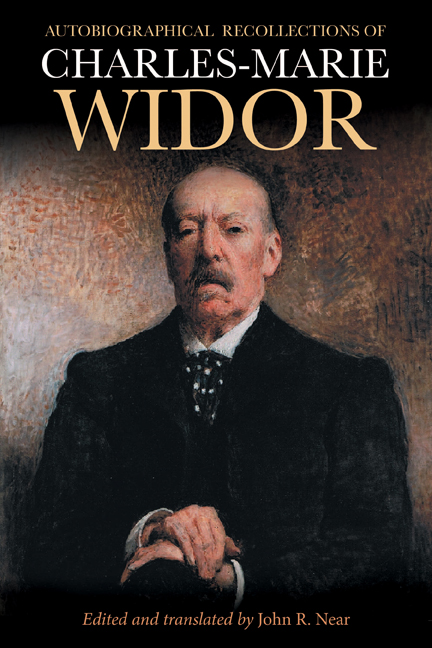Book contents
- Frontmatter
- Contents
- List of Illustrations
- Foreword
- Preface
- Acknowledgments
- Introduction: Tribute to Charles-Marie Widor
- Part One Studies, Early Performances, and Aristide Cavaillé-Coll (1844–69)
- Part Two La Belle Époque: The Franco-Prussian War to The Great War (1870–1914)
- Part Three The Great War and Important Initiatives (1914–37)
- Appendix 1 Birth record of Charles-Marie Widor, 1844
- Appendix 2 Widor’s Diplôme de Bachelier ès Lettres, 1863
- Appendix 3 Widor’s letter of appreciation to Jacques Lemmens, 1863
- Appendix 4 Brussels Ducal Palace organ specification, 1861
- Appendix 5 Widor’s certificate for Chevalier de l’Ordre du Christ, 1866
- Appendix 6 “To Budapest,” 1893
- Appendix 7 Widor’s travels to Russia and his 1903 passport
- Appendix 8 Widor’s list of his works in 1894
- Appendix 9 The Paris Conservatory organs, 1872
- Appendix 10 Chronique [Widor’s appeal for an organ hall at the Paris Conservatory, 1895]
- Appendix 11 Widor’s certificate for the Académie Royale, Brussels, 1908
- Appendix 12 “Debussy & Rodin,” 1927
- Appendix 13 The American Conservatory organ, Fontainebleau, 1925
- Appendix 14 Letters concerning the Trocadéro organ restoration, 1926
- Notes
- Bibliography
- Index
- Eastman Studies in Music
6 - The Cavaillé-Colls, and the Saint-Denis organ
Published online by Cambridge University Press: 09 May 2024
- Frontmatter
- Contents
- List of Illustrations
- Foreword
- Preface
- Acknowledgments
- Introduction: Tribute to Charles-Marie Widor
- Part One Studies, Early Performances, and Aristide Cavaillé-Coll (1844–69)
- Part Two La Belle Époque: The Franco-Prussian War to The Great War (1870–1914)
- Part Three The Great War and Important Initiatives (1914–37)
- Appendix 1 Birth record of Charles-Marie Widor, 1844
- Appendix 2 Widor’s Diplôme de Bachelier ès Lettres, 1863
- Appendix 3 Widor’s letter of appreciation to Jacques Lemmens, 1863
- Appendix 4 Brussels Ducal Palace organ specification, 1861
- Appendix 5 Widor’s certificate for Chevalier de l’Ordre du Christ, 1866
- Appendix 6 “To Budapest,” 1893
- Appendix 7 Widor’s travels to Russia and his 1903 passport
- Appendix 8 Widor’s list of his works in 1894
- Appendix 9 The Paris Conservatory organs, 1872
- Appendix 10 Chronique [Widor’s appeal for an organ hall at the Paris Conservatory, 1895]
- Appendix 11 Widor’s certificate for the Académie Royale, Brussels, 1908
- Appendix 12 “Debussy & Rodin,” 1927
- Appendix 13 The American Conservatory organ, Fontainebleau, 1925
- Appendix 14 Letters concerning the Trocadéro organ restoration, 1926
- Notes
- Bibliography
- Index
- Eastman Studies in Music
Summary
Cavaillé-Coll had received his early education at the University of Toulouse, where he had only studied science. The Cavaillé family came from Gaillac (Tarn). One Cavaillé had built organs two hundred years ago, not only in the Midi but in the north of Spain. Jean-Pierre Cavaillé had married a Mlle Marie-Françoise Coll in Barcelona. The Cavaillé-Colls were two brothers, both organbuilders. There were Cavaillé instruments and Cavaillé-Coll instruments.
The story of the illustrious Aristide Cavaillé-Coll is no less picturesque. His professor of mathematics at the University of Toulouse, who was delighted with his aptitude for science, went one day to tell his father: “My son is leaving for Paris. I have former classmates from the École Polytechnique, Charles Cagniard de Latour, Félix Savart, etc. Allow your son to accompany mine. It may be very useful to him. At the same time, I will introduce him to all my former colleagues. They may be interested.”
The young Aristide showed up one Monday, a quarter of an hour before a meeting of the Académie des Sciences and handed his letter of introduction to Cagniard de la Tour, inventor of the siren, who read the letter, looked Aristide in the eye, thought he looked intelligent, and said to him: “No doubt you have come concerning the organ of Saint-Denis. Have you drawn up a plan? The competition closes next Friday. Are you ready?” The young Aristide, without being concerned, replied: “I don't know anything about the competition for the organ of Saint-Denis. In any case, I will have to ask Papa's permission.” —“If you have anything in your brain, any new ideas, and are able to express them clearly, and have all this work done by Friday, at seven o’clock, then on Saturday you will ask Papa!”
Aristide Cavaillé-Coll returned home immediately and set to work. As the son of an organbuilder and a student of the faculty of sciences, he had acquired a certain amount of experience and designed a number of new plans for the organ, notably from the point of view of the wind system, mechanism, timbres, pressures, etc. This represented a lot of experience, but he lacked practice. Nonetheless, he knew how to present all of his ideas in a plan—perhaps naively, but clearly—in such a way that the jury, which met the following week, classified his report “No 1.”
- Type
- Chapter
- Information
- Autobiographical Recollections of Charles-Marie Widor , pp. 15 - 16Publisher: Boydell & BrewerPrint publication year: 2024

